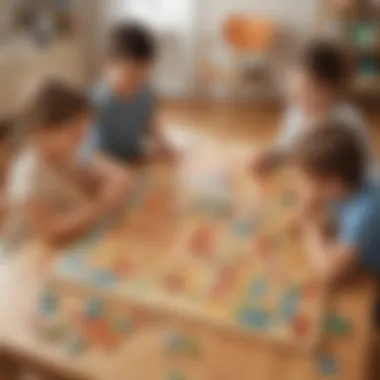Engaging Numbers Games for Five-Year-Olds


Intro
Mathematical literacy is crucial in the formative years of a child's life. Five-year-olds are curious and eager to learn, making it an ideal age to introduce numbers through engaging games. This article focuses on numbers games, aiming to enhance early math skills while providing a fun and supportive learning environment. By exploring various types of games and their educational benefits, parents and educators can foster a solid numerical foundation that supports cognitive development.
Interactive Learning Games
Interactive learning games serve as an engaging platform for children to grasp essential math concepts. These activities not only make learning enjoyable but also help solidify the understanding of numbers in young minds.
Popular Games
There are various games that parents and educators can utilize. Some popular options include:
- Number Bingo: This game familiarizes children with number recognition and counting.
- Shape Hunt: Helps children learn to identify shapes and their corresponding numbers.
- Math Puzzles: Engages children in problem-solving while building basic arithmetic skills.
Description of Top Educational Games
Number Bingo involves cards filled with numbers. Players mark off numbers as they are called out. This game not only enhances listening skills but also encourages quick number recognition.
Shape Hunt gets kids up and moving as they search for numbered shapes in their environment. This kinesthetic approach promotes active learning and helps children make connections between numbers and shapes.
Math Puzzles present various challenges where kids solve basic addition or subtraction problems. These puzzles promote critical thinking and problem-solving abilities.
Benefits of Playing Educational Games for Kids' Cognitive Development
Educational games provide multiple benefits for cognitive development:
- Improvement in Number Sense: Engaging with numbers through games reinforces understanding.
- Enhanced Memory Skills: Many games require memory and recall, leading to better retention of information.
- Social Skills Development: Playing games often requires interaction, fostering teamwork and communication.
Game Reviews
In-depth reviews of selected educational games can guide parents and teachers in making informed choices. For instance,
- Osmo Genius Starter Kit: This set combines digital play with physical interaction. Children can build numbers and shapes, which enhances their understanding of math.
- Free Play Math: An app allowing kids to explore math concepts through interactive challenges. The layout is simple and encourages independent learning.
Comparison of Gameplay and Learning Outcomes
Certain games tend to yield better learning outcomes than others. For example, while digital apps may offer structured learning, hands-on games like Number Bingo provide more social interaction. Balancing both types can be advantageous for comprehensive development.
Tips and Tricks
Practical tips for parents and educators can enhance children’s learning journeys:
- Set a Routine: Incorporate learning games into daily activities, creating a consistent learning environment.
- Use Rewards: Simple rewards can motivate children and add an element of fun.
- Be Encouraging: Positive reinforcement helps build confidence and makes learning enjoyable.
"Creating a supportive learning environment is key to fostering mathematical understanding in young children."
Creative DIY Projects
Hand-on activities spark creativity while reinforcing number concepts. Engaging in creative projects can enhance children’s cognitive and motor skills.
Step-by-Step Guides
One excellent project involves creating a homemade number line. Parents can use tape to create a line on the floor and label segments with numbers. Children can jump or step to each number, reinforcing counting skills in a physical way.
Craft Ideas
Crafting provides an opportunity for artistic expression, reinforcing numbers through creativity. Simple ideas include:
- Number Collages: Use magazines to create collages that correspond with numbers.
- Counting Stones: Paint stones with numbers and use them for counting games.
Engaging in such activities enhances not only math skills but also fine motor skills, which are crucial at this developmental stage.
Intro to Numbers Games for Young Learners


Numbers games play a crucial role in cultivating early mathematical skills in children. For five-year-olds, these games provide a foundation for understanding numbers and their relationships. Engaging with numbers at a young age can stimulate cognitive development, allowing children to explore basic concepts in a fun way. This introduction will elaborate on the significance of these activities, the ways they enhance learning, and their alignment with early childhood education.
Understanding the Importance of Early Numeracy
Early numeracy is the ability to understand and work with numbers. It encompasses a range of skills including counting, recognizing numerals, and understanding basic mathematical concepts. Developing these skills early is essential as they form the basis for more complex math learning later on.
Research indicates that children who engage in numeracy activities during preschool years are more likely to excel in math as they progress through their education. Numbers games contribute substantially to this development.
Through play, children learn to associate numbers with quantities, patterns, and even basic operations like addition and subtraction. They also learn to recognize numbers in different contexts, which reinforces their numerical understanding. These activities not only build foundational skills but also enhance children’s confidence, making them more willing to participate in future math learning experiences.
Defining Numbers Games
Numbers games are activities designed to help children learn mathematical concepts through play. These can range from simple counting games to board games that integrate numeracy into their gameplay. The primary objective is to make learning enjoyable while reinforcing essential skills.
There are many varieties of numbers games suitable for young children:
- Board games that involve counting moves or collecting points.
- Card games focusing on number recognition or basic operations.
- Digital games that provide interactive platforms for practicing math in an engaging environment.
- Outdoor games that emphasize physical activity while still requiring counting or sorting.
Each type of game appeals to different learning styles and interests, allowing caregivers and educators to choose activities that best suit a child’s needs. The eligibility of numbers games in fostering a love for math demonstrates their importance in early education, setting the stage for lifelong learning.
Types of Numbers Games Suitable for Five-Year-Olds
Board Games
Board games are an excellent tool for introducing numbers to young children. They often involve dice and counting spaces, which directly correlates with basic math concepts. Popular games like Chutes and Ladders or Candy Land require kids to count moves and recognize numbers on the board.
Benefits of Board Games:
- Interactive Learning: Children often play with family or peers, encouraging social interactions.
- Turn-Taking Skills: Playing board games teaches patience and the importance of taking turns.
- Critical Thinking: Some games require strategic thinking, improving problem-solving skills even at a young age.
Card Games
Card games can be quite versatile when introducing numbers. Games such as Uno or simple matches with number cards can enhance number recognition. In these games, children often need to identify or compare numbers quickly, which strengthens their ability to visualize numerical concepts.
Card Games Advantages:
- Portable: Easy to play anywhere, making them suitable for travel or family outings.
- Variety: There are many types of card games tailored for different learning levels.
- Competitive Edge: Engages children in a friendly challenge, promoting motivation to improve.
Digital Games
With the increasing integration of technology into education, digital numbers games offer a modern approach for learning. Programs like ABCmouse or Endless Numbers provide interactive and engaging platforms for children to learn math concepts effectively.
Pros of Digital Games:
- Engagement: Colorful graphics and sounds capture children’s attention.
- Feedback Mechanisms: Instant results help children understand their mistakes in real-time.
- Adaptive Learning: Many digital games adjust difficulty levels based on the child’s progress, ensuring tailored experiences.
Outdoor Games
Outdoor games to teach numbers can be both fun and healthy. Activities like hopscotch incorporate physical movement with number recognition. Children jump from one number to the next, combining physical play with cognitive learning.
Outdoor Game Benefits:
- Physical Activity: Supports overall health while learning.
- Group Play: Encourages cooperative learning and bonding among peers.
- Developmental Skills: Improves gross motor skills alongside problem-solving and mathematical thinking.
Educational Benefits of Numbers Games
Numbers games play a crucial role in early childhood education. Their design aims at not just making math enjoyable, but also enhancing important skills that five-year-olds will benefit from throughout their education. Engaging in numbers games can lead to a solid foundation in mathematical concepts. In this section, we explore key elements that highlight the educational advantages of these games, focusing on enhancing mathematical skills, promoting critical thinking, fostering social skills, and encouraging a positive learning attitude.
Enhancing Mathematical Skills
Numbers games provide various ways for children to understand mathematical concepts in an experiential way. They can help with recognizing numbers, understanding quantities, and even basic operations like addition and subtraction. For example, a simple board game that involves counting spaces can improve number sense. Through repeated play, children learn to associate quantities with numbers, which is vital for building more complex math skills later on.
Games like UNO or Connect 4 force children to engage with numbers actively, reinforcing their understanding. It's a hands-on approach that makes abstract numbers tangible and easier to grasp. Moreover, it taps into natural curiosity. Children, by playing and not just memorizing, elevate their math competence significantly.


Promoting Critical Thinking
Critical thinking is an essential skill not just in mathematics but in all spheres of learning. Numbers games require children to make decisions based on previous experiences, strategies, and potential outcomes. For instance, while playing a card game, a child must consider which card to play next, weighing options and predicting what other players might do.
This level of engagement promotes analytical thinking. As they strategize, they learn to evaluate different scenarios before making a choice. Such skills can set a foundation for problem-solving abilities that they need throughout life.
Fostering Social Skills
The social dimension of numbers games should not be overlooked. They provide opportunities for children to interact, share, and negotiate. When playing games in groups, children learn essential social skills such as taking turns, waiting patiently, and collaborating.
These interactions can enhance communication abilities. For example, a child explaining the rules of a game or discussing strategies learns to articulate thoughts clearly. Developing social skills through numbers games also contributes to emotional growth, fostering resilience when facing losses or setbacks within the game context.
Encouraging a Positive Attitude Towards Learning
Creating a positive learning environment is critical in early education. Numbers games can significantly contribute to this atmosphere. By framing math skills in a fun and engaging way, children associate learning with enjoyment rather than frustration.
When children succeed at a game, it boosts their confidence. They come to see themselves as capable learners. This sense of achievement is particularly important at this early stage, as it reinforces their motivation to explore further.
"Developing a love for learning early sets the stage for future educational success."
How to Choose the Right Numbers Games
Assessing Learning Objectives
Understanding the specific learning objectives is the first step in selecting numbers games. Each child has unique needs that require tailored approaches to enhance their numerical skills. For example, if the focus is on counting, games like "Count the Animals" may be suitable. Alternatively, if the aim is to introduce basic addition, a simple card game that involves adding up numbers could be effective.
Set clear outcomes for what you want to achieve through these games. Do you want to improve counting skills, problem-solving, or even introduce basic arithmetic? Aligning the chosen game with these goals can significantly enhance its impact on a child’s learning experience.
Consider differentiating the games based on varying skill levels. A game that adapts to a child’s current abilities ensures that learning is neither too easy nor too challenging, thus keeping engagement high. Use checklists or progress trackers to evaluate whether the games meet the necessary objectives.
Considering Child’s Interests
Next, it is beneficial to consider the child's interests when selecting numbers games. Children are more likely to engage with games that resonate with their hobbies and passions. For instance, if a child enjoys animals, finding dog-themed counting games could captivate them more than generic number-based games.
Observe the child's habits and preferences. This could lead to the discovery of specific topics they are drawn to. Additionally, including themes like superheroes, space, or nature in the game design could further engage them. Allowing children to play a role in selecting games can boost their willingness to participate.
Understanding Developmental Appropriateness
Lastly, ensure that the chosen games are developmentally appropriate. This means considering the child's age, cognitive abilities, and social skills. Look for games that offer a balanced mix of challenge and fun. Games that are too simple may lead to boredom, while complex games could frustrate young learners.
Different games offer diverse ways to learn. Some games may focus on cooperative play, fostering social skills. Others might be more competitive, which can encourage friendly rivalry while still focusing on numbers. It's essential to create a learning environment where the games matched to their developmental stage promote a sense of achievement.
"Choosing suitable numbers games can enhance a child's early learning experience, making math enjoyable and relevant."
This thoughtful approach in selecting numbers games creates valuable opportunities for engagement and strengthens young learners' numerical skills.
Adapting Numbers Games for Diverse Learning Needs
Adapting numbers games for diverse learning needs is crucial in fostering an inclusive environment for five-year-old children. Each child has a unique learning style and pace, influenced by various factors such as their previous experiences, developmental stage, and cognitive abilities. By modifying numbers games, educators and caregivers can create rich, engaging experiences that cater to all learners. This process not only boosts confidence but also enhances mathematical understanding among children with different backgrounds and abilities.
Differentiating Instruction
Differentiating instruction involves tailoring the learning experience to meet the needs of individual children. This can be achieved by adjusting the complexity of the numbers games. For example, a game intended to teach counting can be made more accessible by limiting the range of numbers involved for beginners while introducing more challenging problems for advanced learners.
Educators can also provide various levels of support:
- Verbal guidance: Offer hints or prompts to those who struggle with the game rules.
- Peer support: Pair children with varying skill levels to foster collaboration and learning.
By recognizing and addressing the different abilities within the classroom, teachers can ensure that every child feels valued and motivated to participate.
Incorporating Visual Supports
Visual supports are an effective way to assist diverse learners in understanding numbers games. They provide tangible references that can simplify concepts and enhance engagement. Parents and educators can use several types of visual supports:


- Number charts: These can display numbers in a straightforward manner, helping children remember and recognize numbers while playing.
- Manipulatives: Objects such as blocks or counters can illustrate mathematical concepts, making learning more tactile and interactive.
- Color-coded materials: Using colors to represent different values or groups can help children with distinguishing categories or levels in a game.
Incorporating visual supports helps to reinforce mathematical concepts while catering to visual learners and those who may have difficulty processing abstract information. Ultimately, the goal is to ensure that every child can actively engage and derive joy from numbers games, thus promoting early numeracy skills.
Integrating Numbers Games into Daily Routines
Integrating numbers games into daily routines is a vital step for fostering early mathematical skills in five-year-old children. This approach not only enhances their understanding of numbers but also makes learning a natural part of their environment. Bringing mathematical concepts into everyday activities helps children see the relevance of what they learn in a playful context.
When children participate in numbers games regularly, they develop a stronger familiarity with numbers, counting, and even basic arithmetic. This consistent engagement creates a foundational skill set useful throughout their academic journeys. Moreover, routine integration allows children to absorb lessons in informal settings, thus reducing the pressure typically associated with structured learning.
Play-Based Learning Approaches
Incorporating play-based learning is essential when integrating numbers games. This method emphasizes learning through play, which is particularly effective for young children. They are naturally curious and tend to absorb information better when engaged in enjoyable activities.
Here are a few play-based strategies:
- Incorporating games during mealtimes. For instance, counting fruit pieces or measuring ingredients introduces numbers in a practical context.
- Using everyday items. Toys like blocks can be counted and sorted, while puzzles can introduce sequences.
- Setting up simple challenges. Ask children to group items by color or size, encouraging both logical thinking and numeracy.
The power of play enhances retention of concepts. When children play with numbers, they are more likely to remember what they learned. It is also vital to keep the activities lighthearted, ensuring that the focus remains on fun rather than pressure.
Practical Examples for Home and Classroom
Applying numbers games in a home or classroom setting can take multiple forms. Employing practical examples ensures that these games are accessible and enjoyable for both children and caregivers or teachers.
- Treasure Hunts: Create a treasure hunt with clues involving simple addition or subtraction. Children must solve each clue to find the next one.
- Numbered Hopscotch: Set up a hopscotch that requires children to say the numbers aloud as they hop. This physical activity reinforces counting while promoting coordination.
- Cooking Activities: Engaging children in cooking can teach measuring. For example, how many cups of flour they need or counting cookies as they place them on a tray.
- Storytime with Numbers: Read books that involve numbers and encourage children to point them out. This reinforces recognition and makes connections between numbers and everyday life.
By ensuring that numbers games are part of daily life, children can effortlessly integrate mathematical concepts into their understanding. This natural introduction encourages a positive relationship with learning that can last a lifetime.
Evaluating the Effectiveness of Numbers Games
Evaluating the effectiveness of numbers games is a pivotal aspect of ensuring they serve their educational purpose. Understanding how these games facilitate mathematical skills development helps parents and educators make informed decisions. Effectiveness can be determined through direct observation and feedback. This evaluation process also creates opportunities to adjust strategies for different learners.
Observing Skill Development
Observing skill development in children during numbers games is crucial. Parents and educators can look for indicators like engagement and understanding. When children play these games, they may show improvements in counting, number recognition, and simple addition or subtraction. It is important to focus on how much joy they express while learning.
These observations do not have to be formal. Casual interactions can reveal a child’s grasp of concepts. For example, if a child identifies numbers correctly in a board game, it shows a level of proficiency. Note the time they spend on tasks and their ability to solve problems related to numbers.
Some effective methods for observing include:
- Keeping a journal of progress: Document when children successfully complete tasks, and note their reactions.
- Recording sessions: Video them while they play, paying attention to their problem-solving approaches.
- Setting benchmarks: Identify specific skills to observe, such as counting objects or matching numbers to quantities.
By observing and noting these aspects, guardians can recognize progress and challenges. This understanding can lead to tailored support to enhance learning further.
Collecting Feedback from Children
Collecting feedback from children is another vital component in evaluating numbers games. Young children may not articulate their thoughts in a detailed way, but their comments and behaviors can provide valuable insights. Engage them in discussions about their experiences with the games. Ask them open-ended questions like, "What did you like about this game?" or "Which part was hard for you?"
Their responses can guide adjustments or changes needed for future gameplay. Each statement can give clues about how the game is perceived by the child and its effectiveness in promoting learning.
Methods to collect feedback include:
- Direct conversations: Ask simple questions immediately after game play.
- Observation of reactions: Note excited or frustrated expressions when they face challenges.
- Using smiley charts: A visual approach to express feelings about games can be effective.
Gathering these insights helps improve the selection of games and their execution, leading to better educational outcomes. Ultimately, effective evaluations of numbers games contribute to a richer learning environment for five-year-olds.
By incorporating games into a child's daily routine, parents and educators create opportunities for informal learning. This approach aids in softening the transition into more formal education settings, leaving children feeling confident and excited about learning math concepts. The versatility of numbers games allows them to be tailored to fit individual learning needs. As such, they can accommodate various skill levels and styles. This inclusivity is especially important in early education, where young learners may vary greatly in their mathematical understanding and comfort levels.
Moreover, the social aspect of games encourages collaborative learning. Children learn to take turns, share, and communicate ideas, which enhances their interpersonal skills. These social interactions promote a broader learning experience that extends beyond the numbers themselves. Parents, teachers, and caregivers are vital in recognizing the importance of such games in developing a well-rounded educational approach. Therefore, it is essential to keep evaluating and integrating numbers games into both schools and homes, nurturing a positive relationship with mathematics.
"Learning through play is not just an approach; it is a necessary pathway to instill a love for learning in children."
Recap of Key Points
- Numbers games enhance mathematical skills by providing hands-on, engaging experiences.
- These games promote critical thinking and problem-solving abilities in young children.
- Social skills are developed through interactive play while children learn to work together.
- Early exposure to numeracy fosters a positive attitude towards mathematics.
- Games can be tailored to meet diverse developmental needs.
Future Directions for Learning with Numbers Games
Furthermore, there is potential for increased collaboration between educators and game developers. This partnership may yield educational games that align closely with curriculum standards while making learning enjoyable. There is also a strong push for utilizing culturally relevant materials within games. As our societies become more diverse, it is crucial that numbers games reflect the children who are playing them.
In summary, the future of learning through numbers games looks promising. By continuing to adapt and innovate, we can ensure that these games remain a vital resource in nurturing young minds, fostering confidence in mathematical skills, and laying a solid groundwork for lifelong learning.















